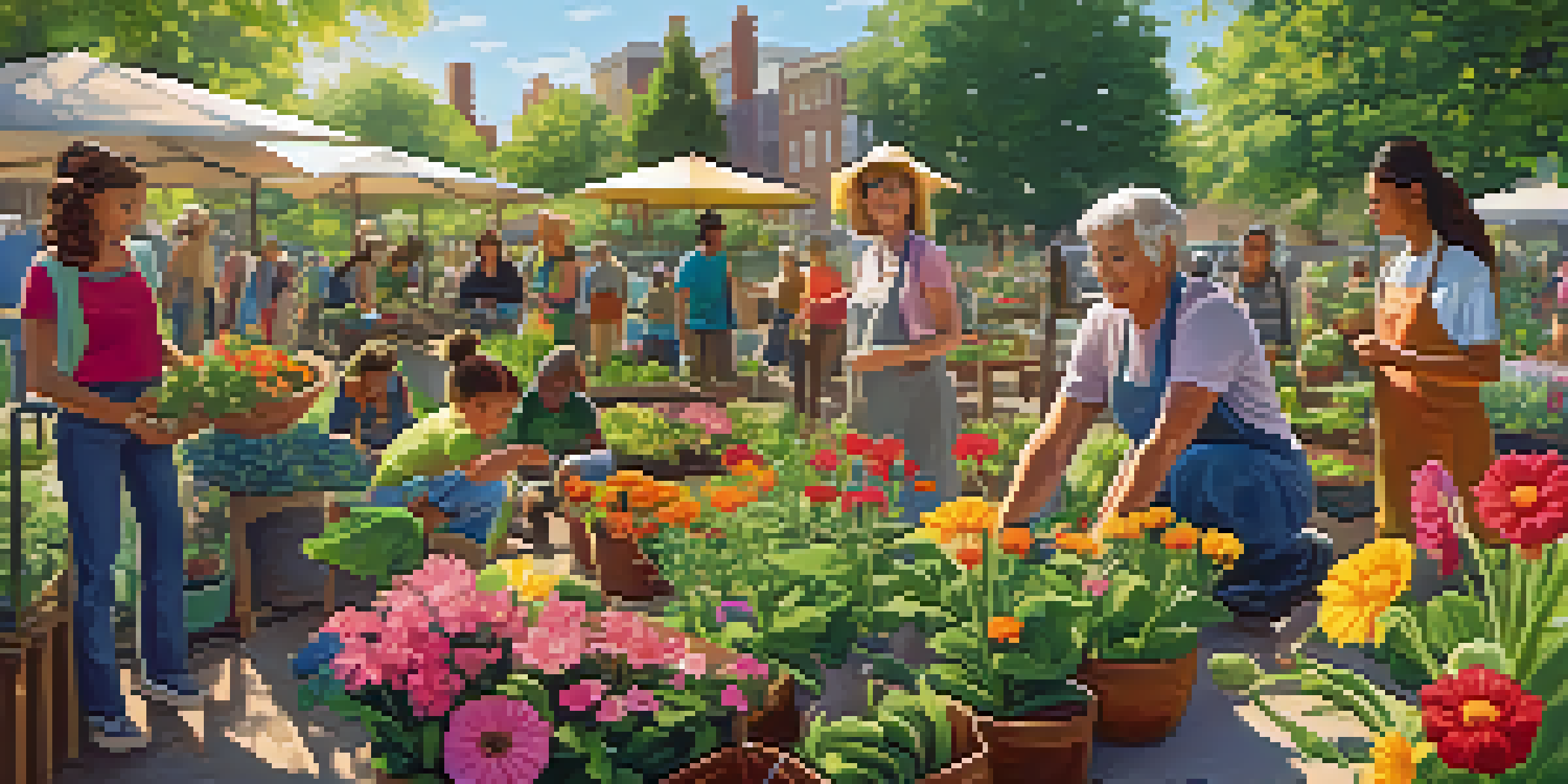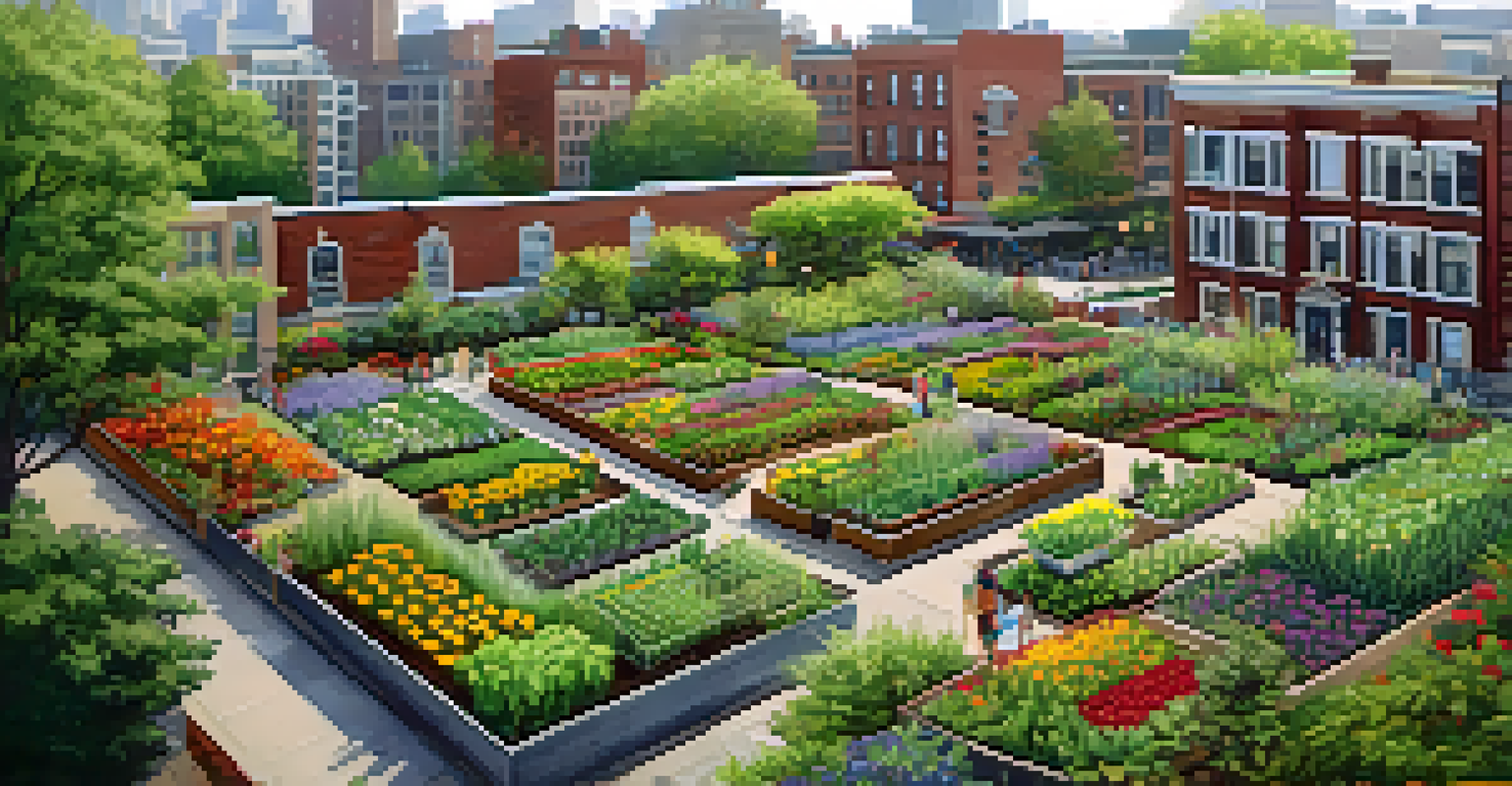Community Gardening: A Pathway to Sustainable Urban Living

Understanding Community Gardening and Its Benefits
Community gardening involves individuals coming together to cultivate shared plots of land. These gardens can vary in size and scope, from small backyard spaces to larger community-managed areas. They not only provide fresh produce but also foster a sense of belonging among participants.
Gardening is a way of showing that you believe in tomorrow.
One of the most significant benefits of community gardening is its ability to promote sustainability. By growing food locally, we reduce the carbon footprint associated with transporting produce from distant farms. Additionally, these gardens help enrich urban biodiversity by providing habitats for various plant and animal species.
Moreover, community gardens serve as educational platforms where participants can learn about sustainable practices. Workshops on composting, organic gardening, and water conservation can empower individuals to adopt greener lifestyles, thus maximizing the positive impact on the environment.
Fostering Community Connection Through Gardening
Gardening is a communal activity, and community gardens serve as vibrant hubs of social interaction. Neighbors work side by side, sharing tips, tools, and produce, which builds strong bonds and friendships. This sense of camaraderie can create a supportive network that extends beyond gardening.

In addition to strengthening relationships, community gardens often attract diverse groups of people. This diversity can lead to cultural exchange, as individuals share their unique gardening practices and culinary traditions. Such interactions foster understanding and appreciation among different cultures.
Community Gardens Foster Connections
These gardens create vibrant social hubs where individuals build relationships and learn from one another.
Furthermore, the act of tending to a garden can be therapeutic. Many participants find joy and stress relief in nurturing plants, creating a shared space that promotes mental well-being. It's a reminder that in our urbanized lives, nature can be a source of solace and connection.
Community Gardening as a Solution to Food Insecurity
Food insecurity is a pressing issue in many urban areas, but community gardening offers a viable solution. By growing their own food, individuals can access fresh, nutritious produce, which is often lacking in food deserts. This not only improves diets but also reduces dependency on expensive grocery stores.
To plant a garden is to believe in tomorrow.
Many community gardens operate as 'give-back' initiatives, where excess produce is donated to local food banks or shelters. This practice not only helps those in need but also cultivates a spirit of generosity within the community. When individuals contribute to the well-being of others, it fosters a deeper sense of purpose.
Moreover, community gardens can serve as a platform for advocating for food justice. By raising awareness about food access issues, these gardens can mobilize communities to demand changes in food policy, ultimately leading to a more equitable food system.
Promoting Environmental Sustainability Through Gardening
Community gardening is a powerful tool for promoting environmental sustainability. These gardens utilize organic practices that minimize the use of harmful chemicals, leading to healthier soil and ecosystems. By prioritizing composting and organic pest control, gardeners contribute to a cleaner environment.
Additionally, community gardens can play a role in urban greening efforts. By transforming vacant lots or underutilized spaces into green areas, they help mitigate urban heat islands, improve air quality, and manage stormwater runoff. This not only enhances the aesthetic appeal of neighborhoods but also improves urban resilience.
Gardens Combat Food Insecurity
By growing their own food, communities gain access to fresh produce, addressing nutritional gaps in food deserts.
Furthermore, these gardens can support pollinator populations, such as bees and butterflies, which are crucial for biodiversity. By planting a variety of flowers and plants, community gardens create habitats that attract these essential creatures, contributing to a healthier ecosystem.
Building Skills and Knowledge in Urban Gardening
Community gardening offers a unique opportunity for skill-building among participants. Many individuals, especially beginners, can learn practical gardening techniques, from seed planting to pest management. This hands-on experience can cultivate a lifelong passion for gardening and sustainable living.
Workshops and community events further enhance learning opportunities. These gatherings can cover a range of topics, including food preservation, cooking classes, and natural resource management. By sharing knowledge, the gardening community fosters a culture of continuous learning.
Moreover, as participants gain confidence and skills, they often take these lessons home. This ripple effect can inspire families to create their own gardens, spreading sustainable practices throughout the community. Ultimately, empowered individuals contribute to a collective shift towards more sustainable urban living.
Challenges Faced by Community Gardens
Despite their many benefits, community gardens face several challenges. Limited access to land can hinder the establishment of new gardens, especially in densely populated urban areas. Securing permissions and navigating local regulations can also pose significant hurdles for aspiring gardeners.
Funding is another common issue. Many community gardens rely on grants or donations to sustain operations, and without consistent financial support, gardens may struggle to thrive. This lack of resources can limit the ability to expand programs or maintain the garden space.
Sustainability Through Urban Gardening
Community gardening promotes environmental health by utilizing organic practices and enhancing urban biodiversity.
Additionally, community gardens require ongoing commitment from participants. High turnover rates can disrupt the continuity of projects and diminish the sense of community. To overcome this, it’s essential to foster a welcoming atmosphere that encourages participation and keeps members engaged.
The Future of Community Gardening in Urban Areas
As urban populations continue to grow, community gardening will play an increasingly vital role in sustainable living. Future initiatives may focus on integrating technology, such as app-based platforms for sharing resources and organizing events. This can streamline communication and foster greater collaboration among gardeners.
Additionally, the rise of urban agriculture can lead to innovative solutions for food production, such as vertical gardens and rooftop farms. By maximizing available space, these approaches can complement community gardens and expand access to fresh food in cities.

Ultimately, the future of community gardening lies in its ability to adapt and evolve. By embracing new ideas and fostering inclusive practices, community gardens can continue to be a cornerstone of sustainable urban living, promoting a healthier, more connected society.